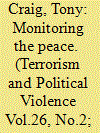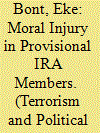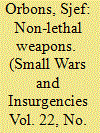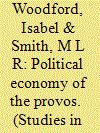|
|
|
Sort Order |
|
|
|
Items / Page
|
|
|
|
|
|
|
| Srl | Item |
| 1 |
ID:
148912


|
|
|
|
|
| Summary/Abstract |
Counterterrorism strategies involving the killing of terrorists are a prominently used but controversial practice. Proponents argue that such strategies are useful tools for reducing terrorist activity, while critics question their effectiveness. This article provides empirical insight into this strategy by conducting a series of negative binomial regression and Tobit estimations of the impact of killing Provisional Irish Republican Army (PIRA) terrorists as well as members of the Catholic community on counts of PIRA bombings and targeting activity in Northern Ireland for the period 1970–1998. We consider the impact of discriminate and indiscriminate killings (where only PIRA militants are killed versus those in which both militants and civilians are also killed) on subsequent PIRA improvised explosive device (IED) attacks. Our findings illustrate that while total and discriminate counterterrorism killings have little to no effect on PIRA IED attacks, indiscriminate counterterrorism killings increased PIRA bombings overall and prompted the Provisional IRA to specifically target civilians in IED events. We conclude by discussing the scholarly and policy implications of these findings.
|
|
|
|
|
|
|
|
|
|
|
|
|
|
|
|
| 2 |
ID:
134172


|
|
|
|
|
| Publication |
2014.
|
| Summary/Abstract |
A common criticism levelled at successive governments of the Republic of Ireland during the Northern Ireland 'Troubles' was their alleged inactivity in the face of a ferocious Provisional IRA campaign. Such criticisms were based in large part on the perception of the southern state as a supply base for militant republicanism. The Republic was undoubtedly a formidable logistics hinterland for such militants. However, criticisms of the reactions of authorities in the south are unfair. This article considers the explosives capabilities of the IRA during the first six years of their campaign. It does so with reference to their attempts to obtain commercial explosives as well as measures employed by them to obtain homemade explosives. The article also considers countermeasures employed by the southern government and reveals the extent to which they sought to shut down IRA capabilities in the south. It is argued that, ultimately, the IRA's campaign in this regard could only be contained and never unilaterally halted.
|
|
|
|
|
|
|
|
|
|
|
|
|
|
|
|
| 3 |
ID:
138074


|
|
|
|
|
| Summary/Abstract |
This paper presents an analysis of the Provisional Irish Republican Army’s (PIRA) brigade level behavior during the Northern Ireland Conflict (1970-1998) and identifies the organizational factors that impact a brigade’s lethality as measured via terrorist attacks. Key independent variables include levels of technical expertise, cadre age, counter-terrorism policies experienced, brigade size, and IED components and delivery methods. We find that technical expertise within a brigade allows for careful IED usage, which significantly minimizes civilian casualties (a specific strategic goal of PIRA) while increasing the ability to kill more high value targets with IEDs. Lethal counter-terrorism events also significantly affect a brigade’s likelihood of killing both civilians and high-value targets but in different ways. Killing PIRA members significantly decreases IED fatalities but also significantly decreases the possibility of zero civilian IED-related deaths in a given year. Killing innocent Catholics in a Brigade’s county significantly increases total and civilian IED fatalities. Together the results suggest the necessity to analyze dynamic situational variables that impact terrorist group behavior at the sub-unit level.
|
|
|
|
|
|
|
|
|
|
|
|
|
|
|
|
| 4 |
ID:
132301


|
|
|
|
|
| Publication |
2014.
|
| Summary/Abstract |
During the Provisional IRA's (PIRA) 1975 ceasefire, two different sets of incident centres were established across Northern Ireland in order to monitor and avert escalation of violence between Republicans and Security Forces. While one group of offices was run by the Northern Ireland Office (NIO) and administered by clerks in the Northern Ireland Civil Service, very quickly Sinn Féin (taking advantage of their decriminalisation in 1974) established their own incident centres to coordinate their communication with the government. This article argues that the establishment of the Sinn Féin incident centres set a precedent for the future political activity of the Provisional Republican Movement; that their activity during the 1975 ceasefire played an important formative role in the evolution of the group's political strategy; and that this experience, acquired from the work done during the 1975 truce, was of far greater influence than is appreciated in current accounts.
|
|
|
|
|
|
|
|
|
|
|
|
|
|
|
|
| 5 |
ID:
188101


|
|
|
|
|
| Summary/Abstract |
Moral injury has recently gained much attention in the field of military psychiatry. However, it has not yet been applied to actors of non-state political violence. Investigating the incidence of moral injury in these populations would increase the understanding of the negative psychological effects of engagement in non-state political violence. This study examined whether moral injury could be applied to former Provisional IRA members who were active during the “Troubles” in Northern Ireland. Nine autobiographical sources from former Provisional IRA members were qualitatively analyzed through interpretative phenomenological analysis. This analysis revealed preliminary evidence of morally injurious experiences and symptoms, and how these symptoms were coped with through reparative actions. There was also evidence of moral disillusionment with the Provisional IRA, and evidence of protective factors that decreased susceptibility to moral injury. The preliminary evidence of moral injury in this population supports the applicability of the concept and indicates that further investigation is warranted.
|
|
|
|
|
|
|
|
|
|
|
|
|
|
|
|
| 6 |
ID:
106062


|
|
|
| 7 |
ID:
158228


|
|
|
|
|
| Summary/Abstract |
Few academically rigorous accounts exist of the financial activities that sustained the rise of the Provisional Irish Republican Army (PIRA) during the Northern Ireland Troubles. Through a sustained methodology this study seeks to challenge some popular preconceptions and address omissions in the limited historical record. The article explores the organization's evolving financial sophistication by analyzing PIRA's acquisition of capital rather than its arms dealings. Using a new quantitative evaluation, this investigation confronts the prevailing understanding that Irish-American funds were of unrivaled significance to PIRA. It points to an array of domestic fund-raisers that collectively provided the overwhelming bulk of revenue. The study reveals also how PIRA developed an extensive reliance on criminal gangs for its expertise in illegal fund-raising, suggesting that moneymaking schemes were perceived as a necessary but unpopular by-product of the greater political objective. Finally, this article briefly explores how the British authorities sought to interdict PIRA's funding. While the general perception is that little was done to counteract PIRA's financing initiatives in the early phases of its violent campaign, this study, nevertheless, reveals that a subtle counterfinance initiative did take place in Belfast across the 1970s. Overall, the analysis enables a more rounded comprehension of the group's financial resilience.
|
|
|
|
|
|
|
|
|
|
|
|
|
|
|
|
| 8 |
ID:
165045


|
|
|
|
|
| Summary/Abstract |
Can nonstate militants professionalize? That is the core question of this piece. Discussions of professionalism have spread to the state military from civilian professions such as education, medicine, and law. This piece examines whether nonstate actors exhibit the same fundamental processes found within these state-based organizations. These fundamentals are the creation of a recognized internal ethos, which acts as a collective standard for those involved. A commitment to expertise and the punishment of those who do not reach these collective expectations reinforce this ethos. To answer this question, this piece examines the development of the Provisional Irish Republican Army (PIRA) during the Troubles. It highlights consistencies and inconsistencies with traditional forces and argues that groups like the PIRA can professionalize and increase their effectiveness in doing so. This widens the field of professionalism studies and provides an additional lens through which to examine nonstate groups.
|
|
|
|
|
|
|
|
|
|
|
|
|
|
|
|
| 9 |
ID:
169917


|
|
|
|
|
| Summary/Abstract |
This paper applies the distance-to-crime approach to the case of Improvised Explosive Device (IED) and shooting attacks conducted by the Provisional Irish Republican Army (PIRA) during the Northern Ireland conflict, 1970–1998. The aim is to (a) measure the typical ‘distance to crime’ (b) detect whether a distance-decay effect is noticeable and (c) investigate whether there is a discernible difference in the distance traveled depending upon individual offender characteristics or aspects of how the offence was committed. In particular, it highlights that many of the same dynamics that influence offender decision making within the volume crime world, also apply within the terrorism realm. Five findings stand out in particular. First, a distance decay effect is identifiable. Second, younger offenders travel significantly smaller distances. Third, complex attacks typically involve greater distances. Fourth, our results show the ability of leading decision-makers within PIRA to impact upon the day-to-day operations of the field operatives. Together the results reinforce the argument that when we focus on terrorism from a preventative angle, we should focus on their behaviors: what they do rather than remain preoccupied with concerns about who they are and/or what they might be like. Collectively the results also highlight the fact that for a finer-grained understanding of terrorist behavior we need to disaggregate on a number of levels: within the cadre of operatives, across terrorist attacks, across targets and within conflicts.
|
|
|
|
|
|
|
|
|
|
|
|
|
|
|
|
| 10 |
ID:
097175


|
|
|
|
|
| Publication |
2010.
|
| Summary/Abstract |
This article revisits the debate, hosted by this journal in the 1990s, on whether the Provisional IRA campaign was sectarian. In the light of current debates about how Northern Ireland deals with its past, it challenges the analysis that emphasises the non-sectarian ideology of republicanism and ignores the effects of IRA violence. It uses research on the IRA campaign in Fermanagh and south Tyrone to argue that the campaign was unavoidably sectarian but rejects current attempts to label it a form of "ethnic cleansing."
|
|
|
|
|
|
|
|
|
|
|
|
|
|
|
|
|
|
|
|
|